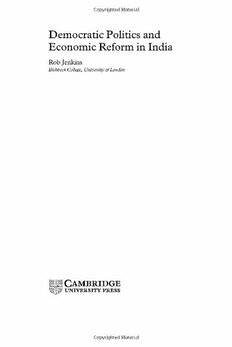
Democratic Politics and Economic Reform in India (Contemporary South Asia) PDF
261 Pages·2000·0.946 MB·English
Most books are stored in the elastic cloud where traffic is expensive. For this reason, we have a limit on daily download.
Preview Democratic Politics and Economic Reform in India (Contemporary South Asia)
Description:
Successive Indian governments have remained committed to market-oriented reform since its introduction in 1991. In a well-argued and controversial examination of the political dynamics that underlie that commitment, Jenkins challenges existing theories of the relationship between democracy and economic liberalization. He contends that while democracy and liberalization are no longer considered incompatible, the new thinking emphasizes the wholesome aspects of democracy, downplaying the temptations of populism and its reliance on obfuscatory tactics in defusing political resistance. In fact, the author argues, it is through such political maneuvering that democracy survives.
See more
The list of books you might like
Most books are stored in the elastic cloud where traffic is expensive. For this reason, we have a limit on daily download.
